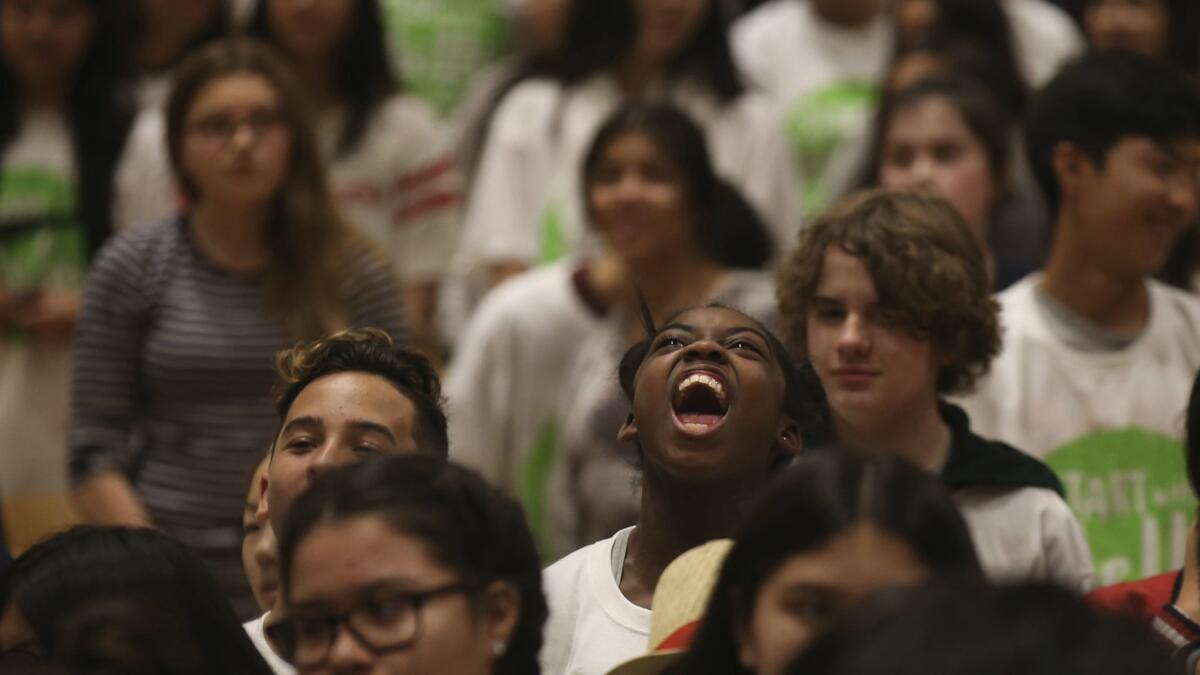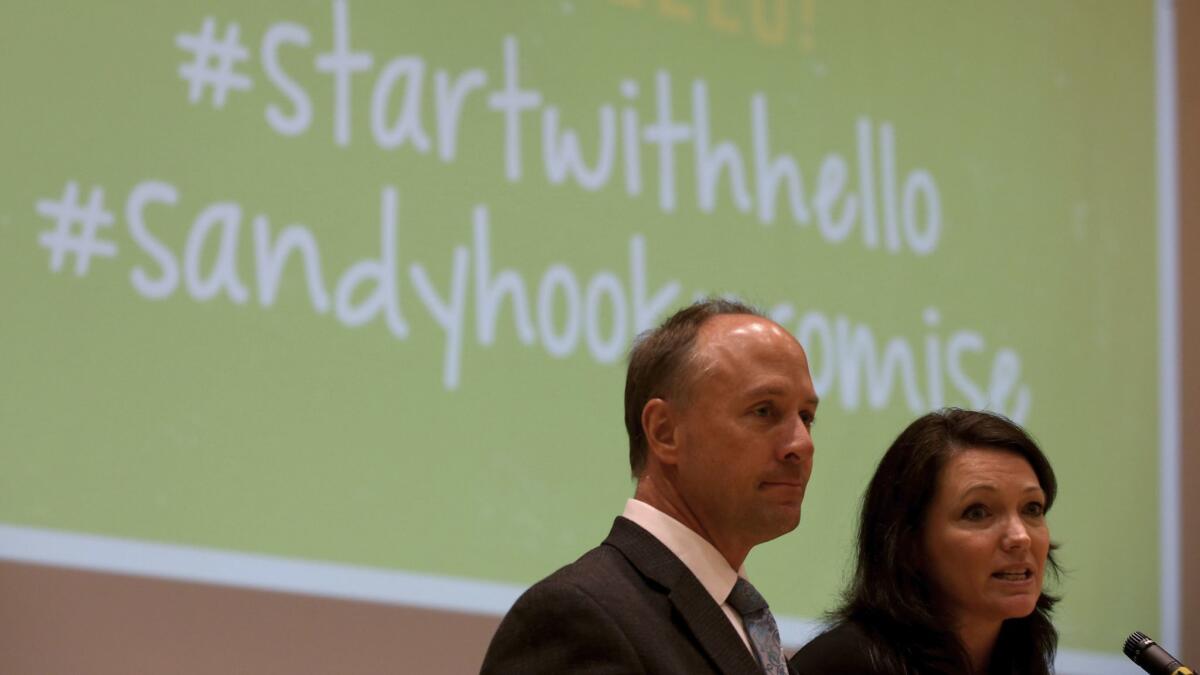‘Start with hello’: Sandy Hook parents turn their grief into hope by teaching L.A. students to reach out to the lonely

- Share via
Every time Nicole Hockley and Mark Barden talk to students, they have to remind themselves: Compartmentalize. Inspire. Don’t cry.
The stakes are personal and painful, life and death. Hockley and Barden each lost a child nearly five years ago in the Sandy Hook Elementary School massacre in Newtown, Conn.
The speeches they give at schools nationwide — including one this week at Eagle Rock Junior/Senior High School in Los Angeles — are an effort to prevent gun violence by working to end social isolation and address mental health.
The more the Sandy Hook parents learned about the shooter who devastated their lives, the more they thought the violence was preventable. If students knew how to befriend an outcast, if they knew to report signs of loneliness and withdrawal, maybe their tragedy and others might not have happened.
Maybe Dylan Hockley, who was 6, and Daniel Barden, who was 7, would be alive.
“One more gesture of outreach to the guy who killed our little children may have been all it took to change that story,” Barden said. “We don’t know. But isn’t it worth it?”
Spreading that message can feel agonizing.
“There are times I can’t talk about Dylan,” Hockley, who has a background in marketing, said in an interview. At a recent Texas appearance, just as grief welled up inside her, a child asked her if she was about to cry.
She had to stop talking for a bit.
One more gesture of outreach to the guy who killed our little children may have been all it took to change that story.
— Mark Barden, who lost his son in the Sandy Hook massacre

Mark Barden and Nicole Hockley, founders of the Sandy Hook Promise, talk to students at Eagle Rock Junior/Senior High School about how to prevent school violence.
The students gathered at Eagle Rock on Thursday to learn about Sandy Hook Promise, the nonprofit organization Hockley, Barden and other parents created to advance their mission after they became discouraged trying to solve gun violence through legislation.
”Raise your hands if you’ve ever felt lonely,” asked Anthony Owliaie, a therapist and presenter for Sandy Hook Promise.
Several hundred hands went up. “Me!” “I do!” “All the time!” broke the silence.
One thing that can help, he told them: knowing a few ice breakers. Kids can walk up to a new student and ask where he or she came from. They can welcome the newcomer to hang out with them. Or talk about favorite movies or emojis.
He taught them three steps, using call and repeat, to get through to others: “See someone alone, reach out and help, start with hello.” The last step is the name of one of Sandy Hook Promise’s campaigns, and the students all wore T-shirts bearing that message.
The program teaches students how to spot loneliness and potential signs of violence, both in person and on social media. It also asks them to monitor their own feelings regularly. “No one is a superhero who cannot be defeated by loneliness or vulnerability,” Owliaie said.
School districts nationwide are trying the program — so far, 1.5 million adults and kids have been trained. Its directors say they get regular feedback. Hockley said they believe a school shooting was prevented in Ohio last spring when a student trained by Sandy Hook Promise overheard a threat and notified a counselor.
But its partnership with L.A. Unified will be the first time the program uses data to track its effects.
“If someone had reached out and said hello to him [the shooter], perhaps we wouldn’t be standing here,” Hockley told the students.
**
The mission felt particularly relevant to some Eagle Rock students. Brittney Velt, 16, stood up and told her peers about Know Your Right, an anti-discrimination group she started. She offered herself up to anyone in need of a friend.
“I myself am a lesbian. I’m out of the closet,” she said.
She said after the event that she has sometimes felt depressed. “The person who did the shooting was alone,” she said. “That’s something I can relate to.”
Brittney pointed to a friend, Argenis Hurtado, also 16, co-founder of Know Your Right. “When I feel that way, he helps me,” she said.
Argenis said he doesn’t feel close to his family, so he leans on Brittney. When he was bullied for being gay, Brittney helped him. “I’m afraid of being alone,” he said, patting her shoulder. “She’s with me.”
Brittney described her own fears in slightly different terms: “I’m scared of being in the dark by myself,” she said. “When I’m stuck in the dark, I make sure he’s there too.”
Sophomore Jade Phong immediately took to Twitter to offer help.
Los Angeles School Police Department Chief Steven Zipperman thanked the students for being “a part of change, the necessary change to prevent any future horrific incidents.”
**
Barden, a musician, tries to keep his presentations short. “I’m going to be more effective and inspirational to kids if they see me as a sign of hope,” he said. “If I’m up there blubbering and crying, it’s hard to look like a sign of hope.”
He and Hockley have chosen a path that forces them to constantly share the most searing memories with strangers.
At Eagle Rock, Hockley told the students about her children: Dylan, who died, had autism. Jake, who was his protector, was in third grade at the time of the shooting and survived.
Like many kids with autism, Dylan would flap his arms up and down so intensely that Hockley said she thought he might take off. Once, she asked him why he did it. Because of his speech delay, she didn’t expect an answer.
But he looked at her, she said, and told her: “Because I am a beautiful butterfly.”
When she thinks about Dylan’s wings, she told the rapt students, she thinks about the butterfly effect — the scientific concept that a tiny shift, like an insect fluttering, can influence a significant outcome, like a tornado on the other side of the world.
As she explained this, she moved her arms up and down.
She asked the students to join her in behaving like butterflies.
“While you all call yourselves eagles, I’m looking at you, and I see butterflies,” she said. “With your eagle wings, you can make huge changes.”
Changes, in other words, that might start with saying hello.
To read the article in Spanish, click here
ALSO
In an age of ‘alternative facts,’ a massacre of schoolchildren is called a hoax
Betsy DeVos squeaks through as Education secretary after Pence casts first-ever tie-breaking vote
This Korean War veteran finally graduated from high school — 67 years after his classmates
More to Read
Sign up for Essential California
The most important California stories and recommendations in your inbox every morning.
You may occasionally receive promotional content from the Los Angeles Times.














